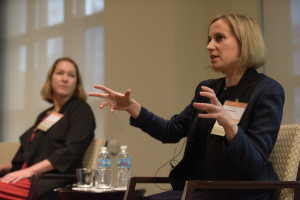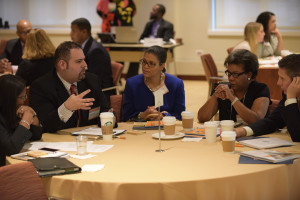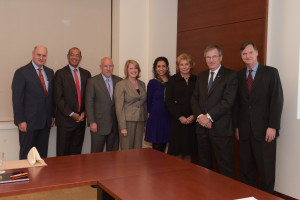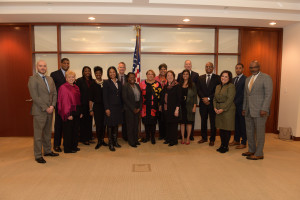On October 30, 2015, the Financial Services Pipeline Initiative convened more than 120 executives and professionals from banking, human resources, diversity and inclusion, community development and philanthropy for its second Annual Summit .
Building on the success of the 2014 Summit and the work of the Initiative in the past year, the Summit marked the release of the Initiative’s research report “Bridging the Diversity Gap: Building African-American and Latino Talent Pipelines for the Financial Services Industry in Chicago.” Researched and written by the Initiative’s research partners, Mercer, the report is a comprehensive overview of diversity and inclusion in the Chicago financial services sector’s member firms (an Executive Summary of the report is also available). Major findings of the report included:
- Based on data provided by participating organizations, the representation of African-Americans and Latinos in positions of leadership in the industry is on course to decline.
- A choke point exists in the promotion of African-American and Latino talent into Senior Management/Executive level positions.
- African-Americans and Latinos experience favorable rates of promotion into managerial-level positions in the industry, but few advance out of those levels and into more senior positions with their current employers. The data indicate that African-Americans and Latinos are more likely to enter Senior Management/Executive positions by being hired into them rather than by being promoted into them.
- Retention of African-American and Latino talent is a major challenge.
- In general, employers report higher rates of attrition of African-American and Latino employees compared to rates for others and notably higher rates of attrition exist where the observed choke point of advancement exists, out of the Managers level.
- The Professional career level offers significant opportunity for launching successful careers in FS for African-Americans and Latinos.
- African-Americans and Latinos experience higher rates of career advancement out of the Professional career level relative to others. They also report, relative to whites, more favorable work experiences and more positive views of the industry and its reputation.
- Early exposure to the industry contributes to its attractiveness to African-Americans and Latinos as a place to work.
- African-Americans’ and Latinos’ interest in working in FS often crystallizes during the high schools years, compared to college years for whites. Internships and co-op programs were cited as some of the ways of generating early exposure and interest.

At the Summit, Mercer staff presented the report both at a private CEO round table session, allowing for robust conversation among theCEOs, and to the full group of Summit attendees. Mercer staff elucidated key findings and their recommended action items for the industry as a whole and for individual employers for improving the recruitment and retention of African-American and Latino talent in Chicago. The report’s findings pointed to the need to prioritize expanding industry recruitment and reducing attrition of diverse talent by filling senior leadership positions from within targeting hiring at the professionals level, monitoring fairness and transparency, and emphasizing retention. At the industry level, the report recommends creating early awareness of career opportunities, expanding the sources of recruitment of new graduates, and looking to other industries for transferable skills.

After the presentation, the attendees of the Summit discussed the implications for collective and individual actions in round table discussions at their respective tables; each table included six to ten people, and the conversations were facilitated by either a Steering Committee member or Mercer staff. The breakout sessions were divided into three topics: “Entering the Industry,” “Working in the Industry,” and “Staying and/or Exiting the Industry.” The Summit closed with each breakout group reporting its top two to three recommendations overall for next steps. Recommendations varied, but focused on Chicago financial services institutions sharing best practices and resources, as well as instituting more robust networks for talent and leadership development.

Dr. Catherine Chandler-Crichlow, President of 3C Workforce Solutions, galvanized attendees with her keynote on the work she
conducted in Toronto to strengthen and widen the pipeline of diverse talent into the financial services sector. Emphasizing collaboration among stakeholders and widening the scope of potential recruitment possibilities outside the predictable sources, Dr. Chandler-Crichlow explained how Toronto was able to leverage the diversity of the city into a diverse, productive financial services sector. She highlighted her recommendations for success in a healthy recruitment pipeline: multi-stakeholder collaboration, structured mentorships, current and future workforce data provided by employers, commitment from all key players, and proactive communications to the job market. Hearing overlap with the ideas brainstormed in the roundtable discussions, Summit participants appreciated Dr. Chandler-Crichlow’s insights and were inspired to follow through on her advice in the next phases of the Initiative.
Indeed, the CEO Leadership Council and Steering Committee of the Initiative will use the insights from discussions during the conference to create action initiatives to address the recommendations in Mercer’s reports. Initiative members hope to leverage the success of the Summit to grow the collaborative effort within the Chicago area industry to address the challenge of underrepresentation of Latinos and African-Africans in the sector.


